ESSAY: Dried Blood and Dandelion Wine
Gabe Combs is in and out of trouble with the law, he drinks too much and, now, he's homeless. This Mpls artist is also determined, ultimately, to earn his way with his artwork. In this utterly candid first-person account, Combs offers his story.
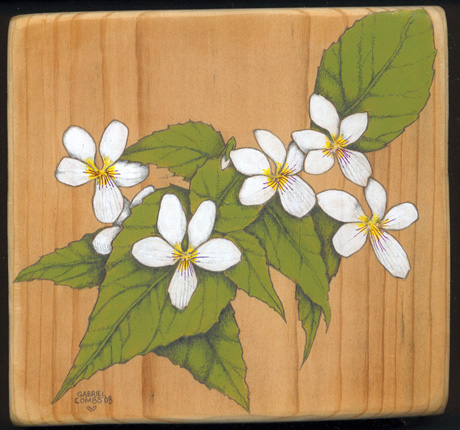
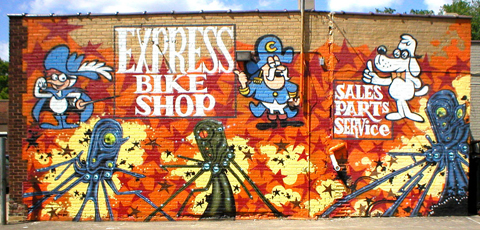
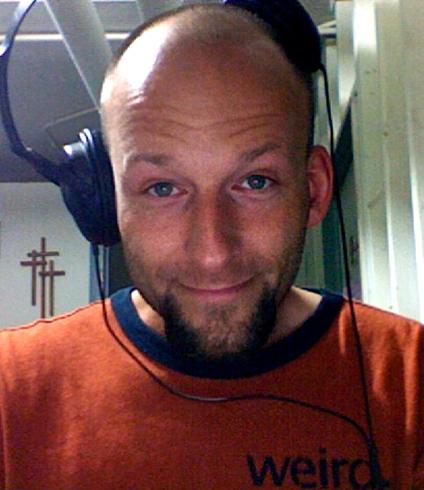
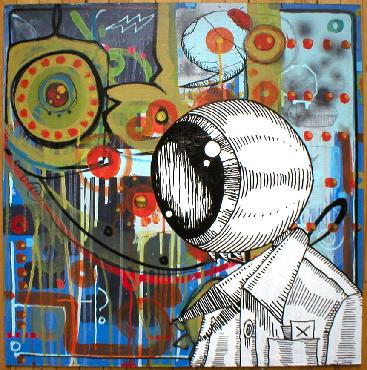
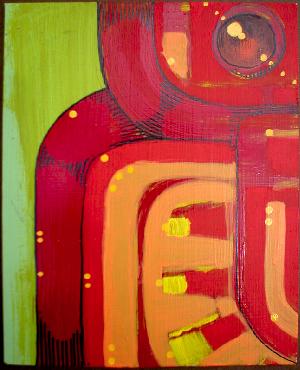
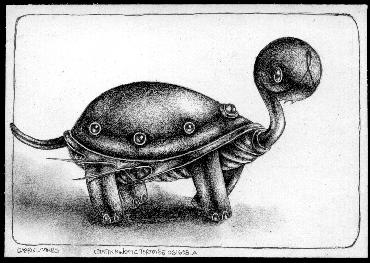
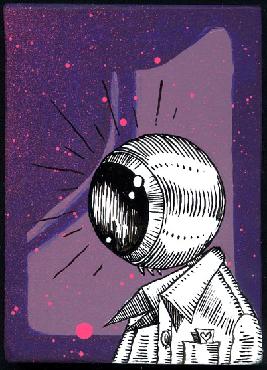
This essay was originally published as a post on The Thousandth Word, a blog on the visual arts presented by The Rake. It is reprinted here with permission.
I GOT THIS IDEA THE OTHER DAY to do dandelion paintings.
I was waiting for the 21 bus to go from the K-Mart on Lake Street to Selby and Dale in Saint Paul, where I was supposed to pick up a check for a recently completed mural for a bike shop. Before leaving the studio, and probably because I’d been overly stressed of late about having no actual living space, I’d smoked a couple of onies of low-grade pot I’d found on the street (stuffed in the cellophane of a cigarette pack). It had been raining while the sun was shining when I found the pot, and I witnessed a rainbow that day that no one else seemed to notice. The pot helps push back most things – other than art ideas, that is. It’s better medicine than most prescriptions.
On the 21 bus, freshly high and scrubbed clean (as clean as one can get from a bucket; I hadn’t had a shower or bath in two months), I felt I was trapped in a video game, grabbing the subconscious shade of green through plastic. I pushed the bar on the back door of the bus and heard a Nintendo sound effect of achievement. The dandelion is a common wildflower that goes through an easily recognized metamorphosis. It’s often called a weed, though not by the National Audubon Society. It came to mind that I could do a mural-sized aerosol painting of a dandelion after it had turned white and was about to blow away in the wind so it could start its cycle over again. I’d find a decaying area of our lofted city and do several aerosol paintings on the big vertical walls of some urban squat or another. It would be a good job for me and would add something to the landscape.
In early June, I was sitting in the downtown Minneapolis jail for getting drunk and making a fool out of myself. I was being a little too honest and a little too much of an ass – probably from all of my recent despair and loneliness – so I ended up in a cell upstairs at the jail. I’d chosen isolation away from the general population of the jail, a choice that gave me only an hour of cell-free time a day. The cell hadn’t been cleaned, and some other man’s “possessions” were still there on the eating table, caked with his dried blood. I started sporadically reading a book of Sherlock Holmes stories and taking in my surroundings. In one spot there were some clumps of human hair. In another, there were some letters and jail papers. The last man appeared to have been reading and writing in Spanish, but he was listed as African-American on the papers. He was a couple years younger than I.
I was wearing orange jail clothes. Since I didn’t know how long I’d be stuck in jail, I stashed two stub pencils in the only place they weren’t likely to look for them – in a space between a bar and the round seat at the table. This was the only design flaw in the cell, from a security standpoint. Everything else was simple geometrical shapes with no lips, overhangs, or ledges that could conceal as much as a cigarette. Nothing could conceal my mind and ideas, however. I had been analyzing the psychology of the cops – which was the good one, which was the bad – just from their passing words of weather small talk. Saving the pencils meant I could draw if I ended up in jail very long. I was interested in reading though, and I wished they’d switch the library cart. I must’ve seen three or four other carts on the handcuffed walk to this room. Last time, they had To Kill A Mockingbird, and I would’ve liked to read that.
Two baloney sandwiches and an apple came in a brown paper sack, but I couldn’t eat them because my jaw was fucked up from the night I mouthed back to three guys. They beat me up and then called the cops on me, probably because I got back on my feet and produced a pair of bolt cutters to chase them off. They left out the fact that they’d beaten me up to the cops. On my first day out of jail, I didn’t get my studio keys or wallet back for four days. They blamed a computer problem for this. The internal affairs forms were useless when they had a faulty machine. I also had a sketchbook that was in police custody from when I got arrested in May. They were throwing the book at me, I guess, ignoring their profit margin on crack dealers, because the sketchbook was supposedly a graffiti book. It isn’t graffiti, of course, but there was no arguing.
On the outside, pressed to figure out how to get back to making art, I thought fast and remembered the owners were remodeling an apartment in the building where I rented my basement studio, so I could ask them for a key to copy. I then went to the hardware store to get keys remade. The guy looked pretty sideways at me, and I couldn’t blame him. I was unshaven and full of anxiety about the repercussions of going to jail twice within a few weeks. I was fortunate to find this place and rent it for just $190 a month, considering I had an eviction on my record. I’d found the space on Craigslist, and the owners seemed OK with the idea of my using it as a painting studio. I sometimes slept in the studio when I couldn’t find a friend’s couch to sleep on. It was pretty clean for a basement, though there were plenty of spiders, silverfish, and common house centipedes.
I had a $30.25 check that the jail gave me, which their bank wouldn’t cash because I didn’t have an ID (it was in the wallet they couldn’t give back to me). Luckily, my regular bank is downtown, and they know me, so, despite my embarrassment, I went there to get my money. All was well now, because I had enough paint and art supplies for the time being – plus, some food, my phone, a toilet, and time to think.
I stayed sober through most of June just because I couldn’t deal with the panic attacks. On the Internet at the library, with new keys in my pocket but still no identity, I saw a friend who was driving by, and I had a coke with him and talked about my situation. As an artist, he’d been close to the same situation on occasion. I told him I was feeling scarred and rejected by society, especially since I’d spent my entire life trying to make things better in the world by making art.
A week later, I was back drinking, fighting the sense of impending doom because of the upcoming court date. I was probably facing further incarceration for long enough that I’d lose my studio, humble as it was. The studio isn’t a home, but it’s a place to make art and to keep my art stuff and slight private personal possessions safe. I’m burning the candle at both ends now – at least until I say to hell with it and throw the every damned thing in the fire.
I sometimes can’t take the worrying about it all. So what, I think, if I lose two drawing tables, an easel, and various stashes of oil and latex paint? So what if I lose some sentimental objects I’ve kept safe from harm for thirty years? I’ve always lived just as chaotic a life as this, but it’s been securely enveloped in a series of locked doors. I’ve always had an official address, and I’ve embraced the trappings of society – a job, a social life, and a bank account that was refreshed every two weeks but always remained a few dollars short at month’s end. There were no frills, just a one-room efficiency, a bike for transport (until it got totaled), no cell phone but a stripped down land-line, a little net access, and a bit of liquor every now and then.
It wasn’t much, but it was more than I have now. Still, I make more art now.
When I lost my last job two-and-a-half years ago and I was facing financial desolation despite a frugal lifestyle, to make ends meet I copied an idea from printmaking. I would make a complete series of paintings – each similar to, but different from, each other – whenever I had squeezed some paint and the colors and ideas were out and fresh. I’ve sold over 400 pieces of art since – for prices ranging from 99 cents up to, recently, just over four hundred dollars (my all-time record). I take endless dumpster-diving missions, and I pick up any scraps of real wood I can find, along with scrap-metal from discarded appliances. The tools for getting this metal – including the bolt cutters that maybe saved my life – resulted in a charge of “intent to commit a crime.” One of my favorite things to find is dresser drawers, the dove-tailed kind especially — although they usually need to be sanded first. I make my paintings ready-to-hang by stringing them with copper wire from dead appliance motors and screws from everything I find. Masonite scraps, familiar to many artists, are another valuable find.
Two-and-a-half years ago I simply decided to make a run at this artist thing, and I’ve been inventing it – rather than just talking about it – ever since. My old friends see me coming and treat me like I’m homeless, which I am, but at least I am fulfilling my dream. They’ve got the same old complaints, and I have as much apprehension about coming into contact with them as they do me. I also have calluses turned to blisters and back again from the struggle to make art, which they don’t.
They’ll go back to their homes, partners, and steady incomes. They’ll drive to a nice vacation spot this summer, while either I sit in jail or I toil away at my art, working toward selling my one thousandth piece.
At the bike shop on Selby and Dale in Saint Paul, the shop owner paid me more than the price we agreed upon, saying “I can’t possibly pay you enough for your time.” The bike shop folk loved the mural, and so did the area residents, which is a confidence builder for someone who, despite the shit he talks, basically feels like everything he paints is shit.
If I lose the last few items I own and my studio, I’ll remain as vital as before – if not more so – as that’s what this thing is. Being an artist is not a fashion statement that passes with the season; it’s not something that hinges on gas prices. Art is something that combines with the culture to establish roots that intertwine with and break up the cement of society so the wildflowers can grow.
Art breaks up a false foundation and replaces it with dirt. I wonder if it’s really possible to make dandelion wine…
About the author: Gabriel Combs is a working artist based in the Twin Cities. You can follow his progress, see artwork, and read more of his story on his blog.